|
|
|
Sort Order |
|
|
|
Items / Page
|
|
|
|
|
|
|
| Srl | Item |
| 1 |
ID:
142193
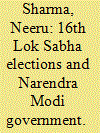

|
|
|
|
|
| Publication |
DelhI, Bookman, 2015.
|
| Description |
240p.hbk
|
| Standard Number |
9788193167434
|
|
|
|
|
|
|
|
|
|
|
|
Copies: C:1/I:0,R:0,Q:0
Circulation
| Accession# | Call# | Current Location | Status | Policy | Location |
| 058391 | 320.54/SHA 058391 | Main | On Shelf | General | |
|
|
|
|
| 2 |
ID:
119045
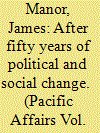

|
|
|
| 3 |
ID:
115718
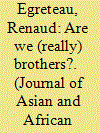

|
|
|
|
|
| Publication |
2012.
|
| Summary/Abstract |
This article considers the views that Chinese diplomats have developed on contemporary India. Using Chinese-written memoirs and essays, as well as discussions with active or retired diplomats of the People's Republic of China who served in India, this research explores the diversity of the Chinese elite's perceptions of the emergence, domestic politics and cultures of India today. It will be argued that four main sets of rather negative perceptions are produced: (1) candid views describing India in naïve, passionate or diplomatic ways; (2) judgemental opinions perpetuating a dirty-cum-messy image of India; and (3) more specifically of its corrupt and volatile communalism-prone society; and, finally, (4) more subtle insights on India's current polity. But, given the perpetuation of rather stable, yet tense, Sino-Indian interactions at the dawn of the 21st century, conclusions will be drawn on the relatively-low impact that Chinese critical perceptions of India have had on Beijing's recent policymaking towards New Delhi.
|
|
|
|
|
|
|
|
|
|
|
|
|
|
|
|
| 4 |
ID:
117119
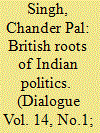

|
|
|
| 5 |
ID:
102112
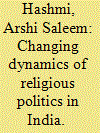

|
|
|
| 6 |
ID:
133671
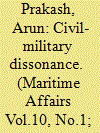

|
|
|
|
|
| Publication |
2014.
|
| Summary/Abstract |
The civil-military equation has been assigned great significance in the national security matrix, and experts consider that nations that fail to evolve a stable paradigm of civil-military relations squander their resources and run grave security risks. In India, this issue has failed to receive the importance it deserves because of the general indifference of the politicians to national security affairs on one hand, and the vested interest of the bureaucracy in maintaining the status quo on the other. It is believed that civil-military relations constitute a zero-sum game in which "civilian control" is retained by reducing the power of the military vis-à-vis the civilians. An irrational but subliminal fear of the military has led the Indian politicians to skew the civil-military equation in favour of the bureaucracy and, in a paradigm unique to India, to place the military under their control. Pointing to the military's sense of grievance and the vitiated atmosphere that prevails in the Ministry of Defence, the author reflects on the price being paid by the nation for endemic "civil-military dissonance" in terms of major national-security shortcomings, as well as the damage being inflicted on the institution of our armed forces.
|
|
|
|
|
|
|
|
|
|
|
|
|
|
|
|
| 7 |
ID:
170901
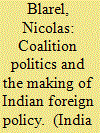

|
|
|
|
|
| Summary/Abstract |
Do Indian regional parties influence foreign policy and under which conditions? Some foreign policy studies have shown that certain coalition-building configurations have facilitated the inclusion of the concerns of small parties in the foreign policy debate. Other works have looked at the role of decentralization and federal power-arrangement in providing more control to political sub-units over the external affairs of a state. Those separate scholarships provide interesting insights to account for the multi-level nature of coalition-building in a federal and pluralistic polity like India. Bridging these two literatures, I argue that the interdependence of regional and national coalition building processes (visible in federal settings) create locked-in alliances between national parties and regional parties which affect foreign policymaking. In these contexts, India’s national parties have to, under certain conditions, take into account the preferences of regional parties when designing foreign policies. This article looks at the hypothesized causal mechanisms and expectations through two illustrative case studies of India’s foreign policy.
|
|
|
|
|
|
|
|
|
|
|
|
|
|
|
|
| 8 |
ID:
100432
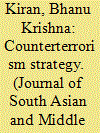

|
|
|
| 9 |
ID:
046625
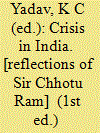

|
|
|
|
|
| Edition |
1st ed.
|
| Publication |
Kurukshetra, Haryana Historical Society (Regd.), 1996.
|
| Description |
86p.hbk
|
|
|
|
|
|
|
|
|
|
|
|
Copies: C:1/I:0,R:0,Q:0
Circulation
| Accession# | Call# | Current Location | Status | Policy | Location |
| 045910 | 954.03/YAD 045910 | Main | On Shelf | General | |
|
|
|
|
| 10 |
ID:
135696


|
|
|
|
|
| Publication |
New Delhi, Rupa Publications India Pvt Ltd, 2015.
|
| Description |
x, 321p.Hbk
|
| Standard Number |
9788129135742
|
|
|
|
|
|
|
|
|
|
|
|
Copies: C:1/I:0,R:0,Q:0
Circulation
| Accession# | Call# | Current Location | Status | Policy | Location |
| 058073 | 954.05/MUK 058073 | Main | On Shelf | General | |
|
|
|
|
| 11 |
ID:
119395


|
|
|
|
|
| Publication |
2013.
|
| Summary/Abstract |
[T]he prospect of India without a stable governing coalition-whether established by the Congress Party, by the BJP, or by regional parties supported by either the Congress or the BJP-is not beyond the realm of possibility.
|
|
|
|
|
|
|
|
|
|
|
|
|
|
|
|
| 12 |
ID:
133034
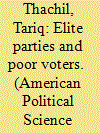

|
|
|
|
|
| Publication |
2014.
|
| Summary/Abstract |
Why do poor people often vote against their material interests? This article extends the study of this global paradox to the non-Western world by considering how it manifests within India, the world's biggest democracy. Arguments derived from studies of advanced democracies (such as values voting) or of poor polities (such as patronage and ethnic appeals) fail to explain this important phenomenon. Instead, I outline a novel strategy predicated on an electoral division of labor enabling elite parties to recruit the poor while retaining the rich. Recruitment is outsourced to nonparty affiliates that provide basic services to appeal to poor communities. Such outsourcing permits the party to maintain programmatic linkages to its elite core. Empirically, I test this argument with qualitative and quantitative evidence, including a survey of more than 9,000 voters. Theoretically, I argue that this approach is best suited to elite parties with thick organizations, typically those linked to religious social movements
|
|
|
|
|
|
|
|
|
|
|
|
|
|
|
|
| 13 |
ID:
158931


|
|
|
|
|
| Summary/Abstract |
Engineering education at the service of economic growth has long been regarded as a policy imperative for developing countries. This paper offers a theoretical analysis of how the ascendancy of engineering education, particularly in post-liberalization India, has played a role in consolidating middle-class narratives of economic liberalism and social conservatism. It shows how a focus on apolitical problem-solving in engineering disciplines can feed into hegemonic discourses on apolitical good governance and meritocracy, propagated by political parties such as the ruling BJP. This assumes significance in light of recent comparative scholarship that educated and professionally oriented middle classes in India and other developing countries, unlike their Western counterparts, tend to be socially illiberal and politically authoritarian.
|
|
|
|
|
|
|
|
|
|
|
|
|
|
|
|
| 14 |
ID:
130789
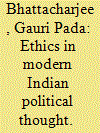

|
|
|
|
|
| Publication |
2014.
|
| Summary/Abstract |
Political _thought is concerned with the state, and the sovereign power of the state is legally unlimited, though it is not arbitrary. It is exercised with the objective of realizing some interest of the state. With the rise of the concept of democracy there arose, not only the importance of the individual but also the long struggle between state sovereignty on the one hand, and individual freedom on the other, ultimately giving rise to the concept of democracy. Democracy does not mean s-imply majority rule. It implies majority rule with full rights of all. The simple view of majority rule gave rise to the misleading concept of democratic dictatorship, and in a democracy an individual, even if he becomes a minority of one, is entitled to enjoy all the rights embodied in the constitution. Democracy therefore implies rights of all and rule by the majority opinion as ascertained periodically.
|
|
|
|
|
|
|
|
|
|
|
|
|
|
|
|
| 15 |
ID:
118081


|
|
|
| 16 |
ID:
001033


|
|
|
|
|
| Publication |
New Delhi, Manohar pub., 1992.
|
| Description |
x, 400p.hbk
|
| Standard Number |
817304001X
|
|
|
|
|
|
|
|
|
|
|
|
Copies: C:1/I:0,R:0,Q:0
Circulation
| Accession# | Call# | Current Location | Status | Policy | Location |
| 040528 | 954.03/ROB 040528 | Main | On Shelf | General | |
|
|
|
|
| 17 |
ID:
130173
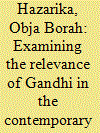

|
|
|
|
|
| Publication |
2014.
|
| Summary/Abstract |
Gandhi's form of protest and life has been resisted and criticized by many in the past and present as impossible, his teachings have led to intense debate and controversies, and this is bound to continue into the future as well. However, amidst the debate and the discussion, Gandhi's teachings are not only kept alive but are constantly produced and re-produced by those seeking to understand Gandhi and apply Gandhi, much like the myth of Gandhi which had become the savior and beacon of hope for many in pre-independent India, preventing them from losing hope under the harsh conditions that had been set up by the erstwhile British colonial rule.
|
|
|
|
|
|
|
|
|
|
|
|
|
|
|
|
| 18 |
ID:
155044


|
|
|
|
|
| Summary/Abstract |
Regional identities have periodically asserted themselves in Indian politics, both before and after Independence. The intensity of this regionalism has, however, tended to vary quite substantially from state to state and over time, ranging from a somewhat benign influence on state politics to demands for secession. These differences are typically explained in terms of specific local political conditions. While the local is undoubtedly important, this article argues that a larger theoretical explanation is also possible: Once we recognize that regionalism operates in multiple spaces, it becomes evident that the way these spaces are experienced has its influence on the practice of local politics. The article goes on to match its theoretical expectations with the politics of regionalism in the neighboring south Indian states of Karnataka and Tamil Nadu.
|
|
|
|
|
|
|
|
|
|
|
|
|
|
|
|
| 19 |
ID:
130169
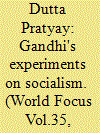

|
|
|
|
|
| Publication |
2014.
|
| Summary/Abstract |
Gandhi was a great leader and an outstanding social and religious reformer of modern India. He devoted his whole life to India's national struggle for independence from the British rule and left rich spiritual heritage to the Indian people and the people all over the world. Gandhi made criticism of the Western material civilization and persistently advocated, for using scattered rural economy to battle against centralized urban competitive economy. Gandhi placed emphasis upon the value of human beings and that of the moral psychology which was in the innermost of man's social nature and cautioned that man's greed was behind exploitation, capitalism and war.
|
|
|
|
|
|
|
|
|
|
|
|
|
|
|
|
| 20 |
ID:
129451
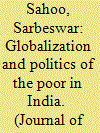

|
|
|
|
|
| Publication |
2014.
|
| Summary/Abstract |
The paper addresses two basic questions in the globalization literature: (1) is globalization a threat or an opportunity? And (2) how far does market deepening actually encourage genuine substantive democracy in the world? Many scholars have argued that globalization has resulted in increasing inequality and marginalization of the poor, which is not conducive for democracy. Drawing on the case of India, this paper, however, argues that the rolling back of the welfare state and the demise of developmentalism led to the mobilization of the masses against the elitist and exploitative agenda of globalization. As a result, a counter-hegemonic vibrant civil society has emerged, which challenges the hegemony of the elites and channels the empowerment agenda of the subaltern groups. This new politics of the subaltern is grounded on the idea of social justice and citizenship rights, which is redefining the nature of the Indian state and democracy.
|
|
|
|
|
|
|
|
|
|
|
|
|
|
|
|
|
|
|
|
|